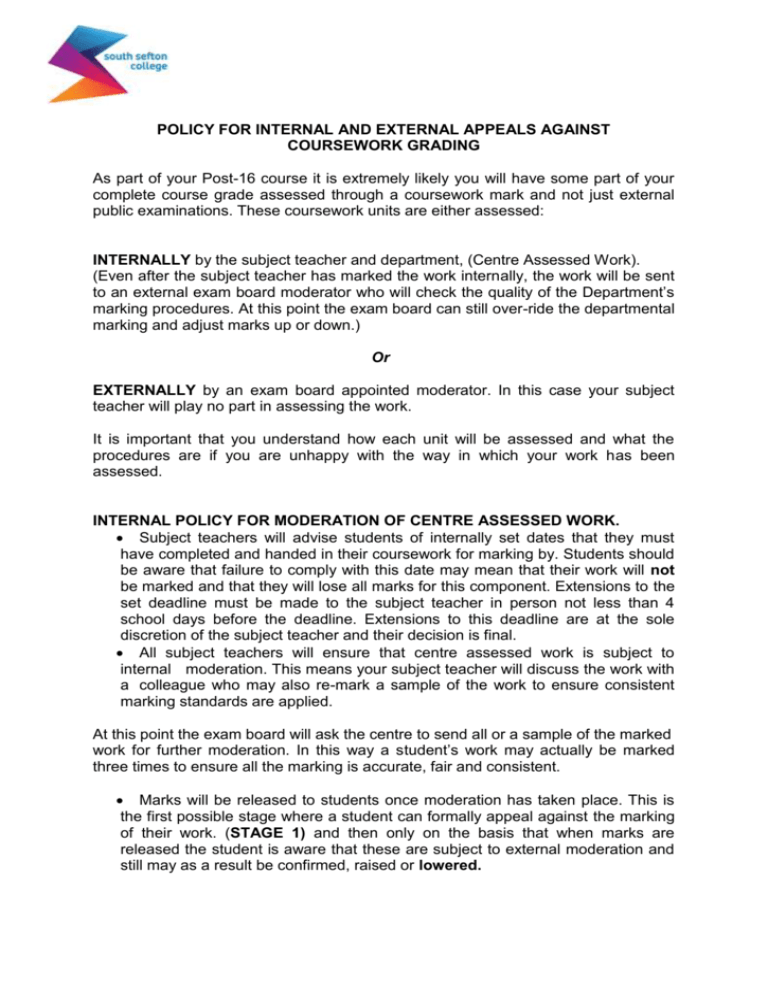Exams-Appeals against In-External Grading
advertisement

POLICY FOR INTERNAL AND EXTERNAL APPEALS AGAINST COURSEWORK GRADING As part of your Post-16 course it is extremely likely you will have some part of your complete course grade assessed through a coursework mark and not just external public examinations. These coursework units are either assessed: INTERNALLY by the subject teacher and department, (Centre Assessed Work). (Even after the subject teacher has marked the work internally, the work will be sent to an external exam board moderator who will check the quality of the Department’s marking procedures. At this point the exam board can still over-ride the departmental marking and adjust marks up or down.) Or EXTERNALLY by an exam board appointed moderator. In this case your subject teacher will play no part in assessing the work. It is important that you understand how each unit will be assessed and what the procedures are if you are unhappy with the way in which your work has been assessed. INTERNAL POLICY FOR MODERATION OF CENTRE ASSESSED WORK. Subject teachers will advise students of internally set dates that they must have completed and handed in their coursework for marking by. Students should be aware that failure to comply with this date may mean that their work will not be marked and that they will lose all marks for this component. Extensions to the set deadline must be made to the subject teacher in person not less than 4 school days before the deadline. Extensions to this deadline are at the sole discretion of the subject teacher and their decision is final. All subject teachers will ensure that centre assessed work is subject to internal moderation. This means your subject teacher will discuss the work with a colleague who may also re-mark a sample of the work to ensure consistent marking standards are applied. At this point the exam board will ask the centre to send all or a sample of the marked work for further moderation. In this way a student’s work may actually be marked three times to ensure all the marking is accurate, fair and consistent. Marks will be released to students once moderation has taken place. This is the first possible stage where a student can formally appeal against the marking of their work. (STAGE 1) and then only on the basis that when marks are released the student is aware that these are subject to external moderation and still may as a result be confirmed, raised or lowered. EXTERNALLY ASSESSED UNITS Actual final marks will be known on results day. This is (STAGE2) Students have two points at which they can raise concerns which may or may not result in an appeal: at stage (1) and stage (2) shown above. At stage (1) they should follow procedures A below and stage (2) the concern will be treated as an Enquiry About Results and they should follow procedures B Students may also want to raise an enquiry about the results of ANY mark awarded following release of results on results day. Procedure B should be followed in these cases, however see your Subject Leader first in such cases. If you are in any doubt or have any questions on these matters please do not hesitate to talk to any of the teaching staff, the college leadership team or the college Exams Officer. PROCEDURE A APPEALS PROCEDURE FOR STUDENTS FOLLOWING RELEASE OF CENTRE ASSESSED MARKS Any student that is unhappy with a mark awarded from an internal assessment should follow the following procedure:Contact subject teacher IMMEDIATELY in person to discuss mark and raise concerns(this discussion does not form part of the formal appeals procedure) Following above discussion if concerns cannot be resolved, the student should lodge an appeal in writing (within 1 week of issue of marks) to the Subject Leader (SL) or subject teacher’s Assistant Principal (AP) (if the subject teacher is the SL). The appeal should be in writing and state the full details of the complaint and the reasons for the appeal. It should be signed and dated by the student. Upon receipt of a written appeal the SL or AP will provide a copy of the appeal to the subject teacher who made the assessment and request a written response from them to the appeal. A copy of which will be sent to the student. The SL/AP will carry out a review of the assessment and respond in writing to the student. Response to be issued within 1 week of receipt of written appeal. If the student is not happy with the written response received, the appeal will be subject to a personal hearing. The student will be informed of the hearing date; at least 3 days notice will be given. The student will be provided with a copy of all relevant documents (e.g. the marks given, the assessments made). The student may present their own case and will be allowed to be accompanied by a (single) carer/friend. The subject teacher and student will have the opportunity to hear each other’s submission to the panel at the hearing. The panel will comprise of a member of the college’s Leadership Team and a Governor who have not previously been involved with the appeal. The decision from the hearing will be made in writing to the candidate within 2 days of the date of the hearing. This decision will be final. A written record of all appeal will be kept by the school and maintained by the Exams Officer. The Exams Officer will inform the Awarding Examination Body if there is any change to an internally assessed mark as a result of an appeal. PROCEDURE B APPEALS PROCEDURE FOR STUDENTS FOLLOWING RELEASE OF MARKS FROM THE AWARDING BODIES “ENQUIRIES ABOUT RESULTS” Any student that is unhappy with a mark awarded from an awarding body upon issue of results should follow the following procedure:Contact subject teacher as soon as possible (but no later than 3 days before the published deadline for Enquiries about Results) in person to discuss mark, raise concerns and discuss the best way forward. The Exams Officer will advise on what options are available to query the mark and the costs involved. Students should be aware that Enquiries about Results (EARs) can results in marks being raised, confirmed or lowered. Students should sign a consent form to confirm that they understand the consequence of an enquiry Subject teacher to review marks and discuss with Subject Leader (SL) or Assistant Principal (AP) agree the way forward taking into account the break-down of marks and grade boundaries and the students predicted grades. If the SL/AP agree to support the enquiry please follow (3) below if not the subject teacher should advise the student as per (4) below. A student may appeal against a decision not to support an EAR’s. Appeals should be made in writing to the Vice Principal for Curriculum (VP) no later than 5 working days before the published deadline for EARs. The appeal should be in writing and state the full details of the complaint and the reasons for the appeal, the appeal should be signed and dated and include a daytime contact telephone number of the student. This information will be reviewed by the VP or another member of the schools Leadership Team if the VP is unavailable and the outcome of the appeal will be communicated by telephone where possible or 1st class post within 24 hours of receipt. This decision is final. (3) If the subject team agree that the school supports an enquiry, the request together with the students consent form should be made to the Exams Officer before the published deadline for EARs. The cost of the enquiry will be taken from the departmental budget. If the enquiry is successful, the fee will be refunded. (4) If the school does not support the enquiry, the student may still proceed in some cases (please contact the Exams Officer to check) with the enquiry but all costs involved need to be paid by the student at the time the enquiry is made. No enquiry will be made unless the fees are paid. Requests should be made in person to the Exams Officer before the published deadline for EAR’s. If the enquiry is successful, the fee will be refunded to the student. Outcomes following EARs will be made in writing by the Exams Officer to the student as soon as they have been received from the Awarding Bodies.






